
Alphabetical Menu
Chronological Menu
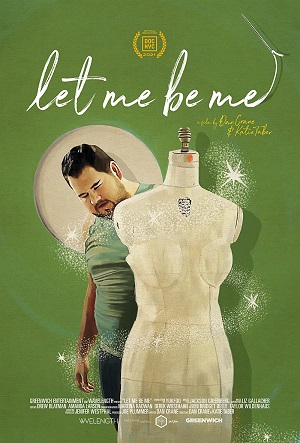 After Yang 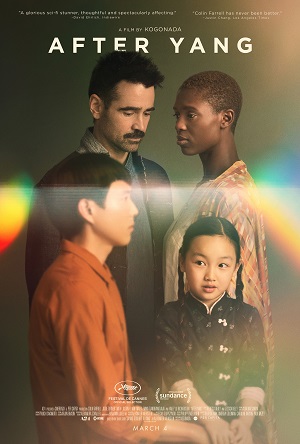 Jake (Colin Farrell) lives with his wife, Kyra (Jodie Turner-Smith) and their adopted daughter, Mika (Malea Emma Tjandrawidjaja). They also have an android, Yang (Justin H. Min), who's like a brother to Mika. When Yang malfunctions, Jake struggles to find a way to fix him because he's out-of-warranty. He hopes that Russ (Ritchie Coster) can repair him before it's too late. Meanwhile, he discovers that Yang might contain spyware and that there's a memory chip inside of him that reveals a lot about Yang's life that he didn't know. Based on the short story by Alexander Weinstein, After Yang has an intriguing premise that sounds provocative. Unfortunately, the execution of that premise by writer/director Kogonada leaves a lot to be desired because the film bites off a lot more than it could chew. It has a lot of interesting ideas about love, technology and what it means to be human, but it barely scratches the surface. Kogonada barely shows the relationship between Yang and Mika when Yang was fully functioning. Instead there are a few flashbacks to those brief moments which Jake watches via Yang's memory chip, but not nearly enough to explore the bond of friendship between Yang and Mika. Then there's an underdeveloped subplot involving a museum curator, Cleo (Sarita Choudhury), who wants Yang to be exhibited at the museum. Cleo is the one who helped Jake to learn that the chip isn't spyware to begin with, so maybe she has good intentions for Yang, maybe not. Again, that's yet another theme that remains under-explored. Once Jake looks inside Yang's memory bank, it's like opening Pandora's box. Should Jake have any right to see Yang's private moments, especially if it reveals a secret life of his? Maybe, maybe not. That all depends if androids have similar rights that humans have. In yet another contrived, tacked-on subplot, Jake searches for a mysterious woman who Yang had a relationship with. The woman turns out to be Ada (Haley Lu Richardson), but Kogonada doesn't show enough of Yang's relationship with Ada, so that subplot falls flat as well on emotional level. The same can be said about the relationship between Jake and his wife, Kyra. The strongest aspects of After Yang are its visual and aural aesthetics such as its cinematography, set design, musical score and sound design. The film looks stylish and even has some visual poetry at times, but not enough to invigorate the film. The pace moves slowly much like it did in Kogonada's last film, Columbus, so it does allow the film some room to breathe. The performances are decent without anyone standing out. If only After Yang had more to say about its provocative themes, there would've been a lot more to ponder during the slow and quiet moments. Bicentennial Man is a much more moving and powerful sci-fi film that also shows how an android affects a family, but that film explored its larger themes with more depth than After Yang. At a brief running time of 1 hour and 36 minutes, After Yang is visually stylish, yet emotionally hollow and undercooked.
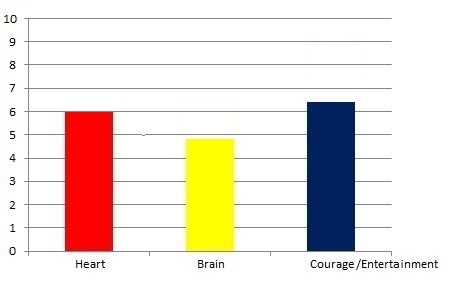 Asking for It  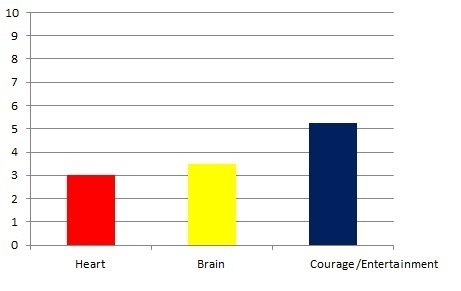 The Batman  A ruthless madman goes on a murder spree in Gotham City while leaving behind a letter card with clues address to Batman (Robert Pattinson). It's up to Batman and Police Lieutenant James Gordon (Jeffrey Wright) with the help of Selina (Zoë Kravitz), a.k.a. Catwoman, to find the serial killer and to determine his motive. The new Batman is nothing like its predecessors. Writer/director Matt Reeves and co-writer Peter Craig go for a much darker, serious tone and a plot that's more of a murder mystery than an action adventure. Unfortunately, the suspense wanes once the mystery behind who's the murderer, The Riddler (Paul Dano), gets revealed early on. His motive isn't very surprising, and he seems like he's pretty much Jigsaw from the Saw series, especially when leaves behind video clips with messages. It's obvious from the get-go that something sinister must be going on in the club that The Penguin (Colin Ferrell) runs. He and his smarmy boss, Carmine Falcone (John Turturro), clearly have something to hide which has something to do with the murders. There's some use of technology used to help solve the murders that's remininscent of the technology used in the underrated techno thriller from the 90's, Strange Days. Batman and Lieutenant Gordon have a few witty, dryly funny lines of dialogue as they investigate the murders, but, for the most part, The Batman maintains its grim tone. That tone becomes monotonous by the 2-hour mark with yet another hour to go. With more comic relief for the sake of levity, it would've been fun rather than monotonous. That said, it's refreshing that Reeves and his co-writer don't resort to bombarding the audience with action because otherwise The Batman would've been far too exhausting. They don't flesh out the relationship between Batman and his butler, Alfred (Andy Serkis), enough, so when it comes time for an intense scene that wants the audience to tug at the audience's heartstrings, the beats don't land as hard as they would've had that relationship been explored more. Just as expected, the last 30 minutes have the most action and thrills, but the thrills aren't palpable or exhilarating like they are in Christopher Nolan's The Dark Knight. The Batman's production values are pretty impressive with stylish set design, lighting and camerawork. The pace moves rather slowly for a blockbuster which is refreshing. The muted colors, mostly black, grey, brown and red, enhance the grim atmosphere, although, to be fair, it eventually becomes repetitive. It's also worth mentioning the terrific use of music with some great songs in the soundtrack that enliven the film every now and then. Robert Pattinson exudes plenty of charisma in the titular role, although the screenplay doesn't give him much to display his broad range of acting talents here. His performance is understated for the most part. Colin Ferrell looks even more unrecognizable than Jared Leto did in House of Gucci. The highlight is John Turturro who's very well cast as The Penguin's boss. Unfortunately, The Batman's biggest flaw is its bloated 3-hour running time. It's not good for the audience to feel the weight of a film's running time. Had Matt Reeves and the editor shown some restraint and trimmed the film by about 30 minutes, it wouldn't have felt like a chore to sit through. Last year's Spider-Man: Far From Home is lengthy, too, but it's so entertaining and exhilarating that you don't feel the weight of the running time. The same can't be said for The Batman. 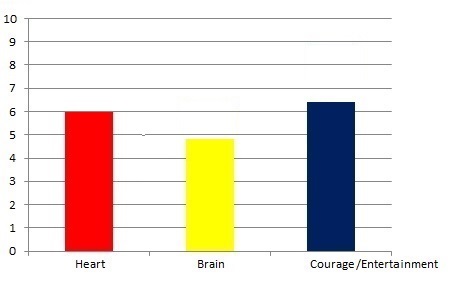 Great Freedom 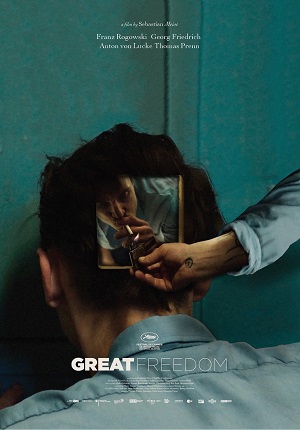 Hans Hoffmann (Franz Rogowski) gets sent to prison three times between 1945 and 1968 for breaking Paragraph 175, the law comdemning homosexuality in Germany. During his prison stints, he befriends an older, homophobic cellmate, Viktor (Georg Freidrich). The screenplay by writer/director Sebastian Meise and co-writer Thomas Reider doesn't waste its time introducing the character of Hans. They begin by showing police footage of him engaging in homosexual acts in a bathroom with a stranger before he's sentenced to prison in 1968. The audience doesn't know right away that he has already been to prison in the past, but they learn that eventually when the film flashes back to 1945 when Hans and Viktor first met. Great Freedom is fundamentally about how the friendship between Hans and Viktor evolves throughout the years. They become deeper friends, but this isn't anything like the schmaltzy Hollywood film The Shawshank Redemption nor is it as gritty and brutal as the prison film Starred Up or A Prophet. Instead, the filmmakers opt for emotional grit instead and keep the thriller, intense elements understated. They don't try too hard to tug at the audience's heartstrings, either, so they trust the audience's emotions without hitting them over the head or spoon-feeding them. You get to know Hans not through narration, but by observing him, even during his moments of silence. He's a stranger to the audience at the beginning, however, by the time the end credits roll, you get the chance to get to know him as a human being. He's trapped in a physical prison, but it's his emotional prison that makes him all the more compelling and relatable as a character. Viktor, too, has his own emotional prison to deal with and traumas to cope with. To watch them bond and connect on a human level as friends is profoundly moving. It would be safe to say that the power of their friendship makes Great Freedom essentially a love story, in a way. Franz Rogowski gives a nuanced and tender performance as Hans. He manages to captivate the audience just through his facial expressions alone even when there's no dialogue. That's a testament to both his performance as well as the screenplay and filmmaker's restraints. He's brave for displaying his emotions on screen so convincingly while opening the window into the soul of Hans. The same can be said about Georg Freidrich. Their chemistry and bond remains palpable---even more than the chemistry in Hollywood romances like Marry Me. Director Sebastian Meise wisely grasps that less is more. Nothing is overstated in Great Freedom nor does it need to be. Also, the slow-burn pacing helps the audience to more easily absorb the scenes, so the filmmakers trust the audience's patience. Patience, after all, is often rewarding which is the case with Great Freedom, especially in the third act which feels just as cathartic and even more powerful than the over-the-top third act in The Shawshank Redemption. At a running time of 1 hour and 56 minutes, Great Freedom is spellbinding, tender and genuinely heartfelt.
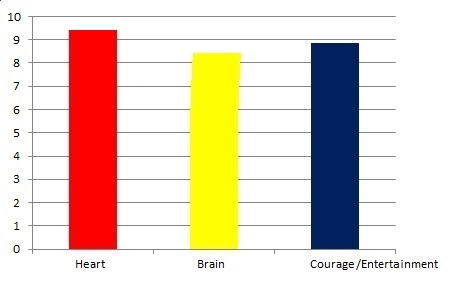 Huda's Salon 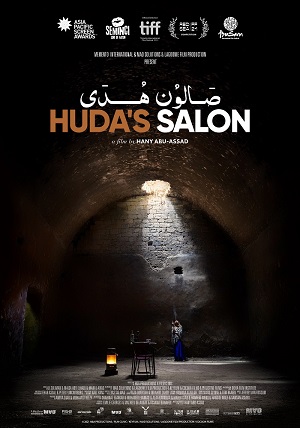 Huda (Manal Awad), a hair stylist, owns a salon in an occupied Palestinian territory. She blackmails a customer, Reem (Maisa Abd Elhadi), into joining the Israeli secret service. Reem has a baby and a husband, Yousef (Jalal Masarwa), whose lives would become endangered if joins the occupiers' secret service. Hasan (Ali Suliman), a member of the Palestinian secret police, kidnaps Huda and interrogates her connections to Israel's secret service. Huda's Salon barely sets up the first act of its plot before jumping right into the meat of the story when Huda knocks Reem out and photographs her naked with a man while using the photos to blackmail her into joining the Israeli secret service. Soon after, Huda ends up kidnapped. Writer/director Hany Abu-Assad jumps back and forth between both storylines which would've worked much smoother with a less overwrought and dull screenplay. The dialogue often sounds stilted and too on-the-nose, but at the same time, it doesn't get to know any of its characters' lives enough. The interrogation scenes are contrived and clunky which makes it hard to be emotionally invested in them or to feel much in terms of suspense despite the potential for it, especially given the premise. It's also not easy to be absorbed by either of the storylines because just when one of them begins to be intriguing, Abu-Assad cuts to the other storyline. Too much goes on, yet the film feels shallow and increasingly lethargic. Abu-Assad fails to humanize any of the characters. They seem like they're just there to move the plot forward. but that relates to one of its other problems. The plot rarely feels like it has much forward momentum; it goes around in circles during the interrogation scenes that fall flat. The performances are decent, but nothing exceptional that manages to breathe life into the anemic screenplay. The cinematography is just as forgettable and the same can be said about the unimaginative lighting and set design which doesn't stand out either. That would've been fine if there was something else for the audience to be engrossed by, but there isn't, unfortunately. Worst of all, though, is the editing which feels abrupt, choppy and even awkward at times. Sometimes style can compensate for the lack of substance, but there's not much visual style or flair in Huda's Salon. At a running time of 1 hour and 31 minutes, Huda's Salon is an often dull, clunky and contrived political thriller. 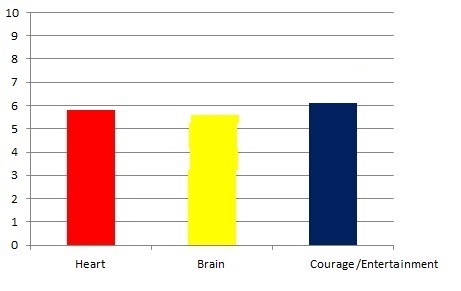 |